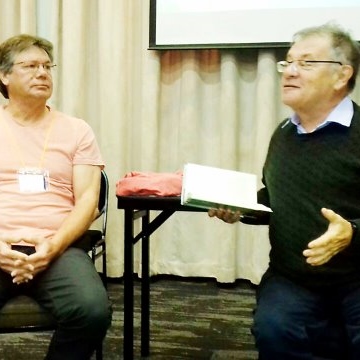
News

A Habonim start to a trade union career
MOIRA SCHNEIDER
In a discussion titled “Going Inside the Trade Union” on Johnny Copelyn’s recent memoir, “Maverick Insider”, Judge Dennis Davis asked how much of an influence. “Habonim was very, very influential in my outlook – it inspired my utopian hopes and dreams,” said Copelyn. “I’ve probably declined since, but so have they!”
Copelyn, a prominent union leader for the two decades preceding 1994, was general secretary of SACTWU (the Southern Clothing and Textile Workers Union), one of Cosatu’s three largest affiliates. He recalled that the ANC had been “very antagonistic” towards the union movement during the ‘70s.
He related that the Frame Group was the biggest employer of their members and at one point intended retrenching 300 of them. “We asked them why they didn’t start a new business making overalls for their workers instead.
“They said, ‘If you think it’s so easy – here’s the money, you do it!’ So the union started the factory with the 300 retrenched workers – the worst 300 were foisted on us, an entirely untrained group of people, because of the new skills that were needed.
“Those worst 300 became star performers. The factory is still going today and the union still owns it.”
Referring to cheap Chinese imports, Copelyn referred to “so-called good African nationalists who make such a mess that it’s intolerable. That’s a disaster for the textile industry and has led to the collapse of the clothing industry.
“It is not recognised as being a consequence of poor policies by the state and that is an issue for me,” he stated.
Commenting that the unions had been “absolutely captured” by getting a handful of their leaders to become prominent ANC members, Copelyn said that despite Cosatu’s alliance with government, the unions “were a very central opposition to (former President Thabo) Mbeki’s Aids denialism and should be lauded.”




